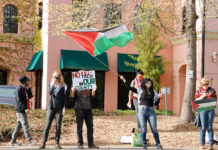A fascinating new rationale is going around to explain why wineries have to throw so many big parties. It has to do with a relatively new social force called “wine club pressure.”
Armida Winery co-owner Steve Cousins used the phrase the other day to explain why he had hoped to hold as many as 30 weddings a year at his Healdsburg winery on Westside Road. Weddings and other special events are vital, said Cousins, to promote and sell Armida’s agricultural products, i.e., wines made from grapes, some of which are actually grown in Armida’s vineyard overlooking the majestic Dry Creek Valley.
Cousins’ attorney mentioned wine clubs too. All the hundreds of special events, weddings, dinner parties, music concerts, barrel tastings, Easter egg hunts and dog shows that wineries are now using as “promotional tools” are simply a way of “keeping wine club members happy,” said Healdsburg attorney Herbert Terreri, speaking to the Sonoma County Planning Commission.
A local wedding caterer also cited the emerging power of wine club clout. Wine clubs have become “the holy grail of the wine industry,” said Bruce Riezenman of Cotati’s Park Avenue Catering.
The message from event-oriented wineries such as Hop Kiln Winery, which last year proposed a controversial event center to host big gatherings with rock bands on Westside Road, seems to be that if it’s what wine club members want, then we’ve got to give it to them to stay competitive and survive.
Event wineries say the wine tasting “experience” needs to include a sense of where you are, hopefully in pleasant surroundings, such as the tasting room of an immaculately landscaped winery with a stunning view of expensive real estate. If there’s a rock band playing it’s only because of wine club pressure.
Needless to say Riezenman and others in his line of work are enthusiastic about this new dimension to what’s traditionally regarded as agriculture: namely growing stuff to eat.
With wine club pressure becoming a potent new force shaping wine country’s evolution, from the old rural agrarian landscape of grapevines tended by immigrants to a new international party destination, we might wonder what the wine clubs will demand next. Slot machines? Roulette wheels and sequined feathered showgirls? Drag racing?
What some people are starting to wonder, especially when contemplating winery promotional messages that dwell not only on the excellence of the wine but on the sumptuousness of the tasting area, the fabulous view and the ready availability of the premises for a corporate gathering or a wedding, is if their wine is so great, why do they need retreats and weddings? Are they winemakers or entertainers? Are they paying attention to the grapes, tending their vines and getting their hands dirty, or are they party hosts blowing noisemakers and tossing confetti?
All of the above, party-hearty winegrowers seem to be saying. It’s all about direct sales, showing off your vineyards’ terroir and accommodating loyal customers’ wishes. The wine club wants to party at the winery? We’ll throw a bash. Clubbers want to marry in the vines? No problem. Cut the cake and pour the bubbly.
Since when did Sonoma County’s agricultural survival become dependent on West Dry Creek Road being congested with limousines full of party goers? Who figured this out?
It may be just the beginning. As we already know, the level of suffering in Dry Creek Valley often has to do with how obnoxious the lavish party is on the acreage next door. It’s like there’s an emerging Great Gatsby factor in wine country. The entertaining spectacle of millionaires bitching at each other over their compromised quality of life may become a whole new reason for people to visit Healdsburg.
Cooler heads know it would be a mistake to look at this predicament as Us versus Them, as wine promoters versus rural residents, parties and noise v. peace and quiet. It’s not villains against victims.
“We’re all in this together,” said Dry Creek Valley Association member Judith Olney. “We’re neighbors.”
— Frank Robertson is a local columnist and news writer.
76.8
F
Healdsburg
April 21, 2025








